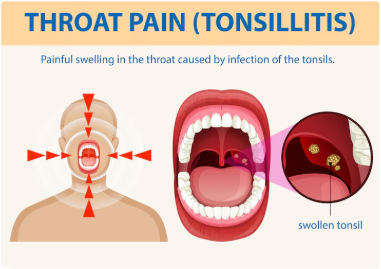By : Geraldus Sigap

Severe sore throat, enlarged tonsils, and difficulty swallowing? Don’t take it lightly. These symptoms may indicate acute tonsillitis, commonly known as inflamed tonsils. This condition frequently affects both children and adults, and can disrupt daily activities if not treated properly.
What Is Acute Tonsillitis?
Tonsillitis is inflammation of the tonsils, two lymphoid tissues located at the back of the throat. In acute cases, the inflammation occurs suddenly and may last from several days up to two weeks. It is usually caused by viral infections but may also result from bacterial infections, particularly Streptococcus pyogenes.
Symptoms of Acute Tonsillitis to Watch For
Symptoms may vary, but common signs include:
- Sudden and severe sore throat
- Pain or difficulty when swallowing
- Enlarged, red tonsils or white patches on them
- Fever and chills
- Bad breath
- Headache or ear pain
- Hoarse voice or voice loss
- Swollen lymph nodes in the neck
In children, symptoms may include decreased appetite, irritability, or vomiting.
Causes of Tonsillitis
Tonsillitis can be caused by:
- Viral infections (adenovirus, influenza, Epstein-Barr virus)
- Bacterial infections, mainly group A beta-hemolytic streptococcus (Streptococcus pyogenes)
Risk factors include:
- School-aged children
- Close contact with respiratory infection cases
- Crowded environments with poor ventilation
How Is Tonsillitis Diagnosed?
Diagnosis is made by a physical exam. If a bacterial infection is suspected, the doctor may perform:
- Throat swab for rapid strep test
- Blood test (if mononucleosis is suspected)
Treatment Options
Treatment depends on the cause:
- For viral tonsillitis:
- Rest
- Warm fluids
- Pain relievers like paracetamol or ibuprofen
- Warm saltwater gargle
- For bacterial tonsillitis:
- Antibiotics (usually penicillin or amoxicillin, prescribed by a doctor)
It is important to complete the full course of antibiotics to prevent resistance or complications.
When to See an ENT Specialist
Consult a doctor if you or your child experiences:
- Fever > 38.5°C lasting more than 3 days
- Inability to eat or drink due to pain
- Severely swollen tonsils or pus-filled tonsils
- Neck pain or stiffness
- Sudden foul breath
Is Tonsil Surgery Necessary?
Tonsillectomy (tonsil removal surgery) may be recommended if:
- Tonsillitis recurs more than 5–7 times a year
- It causes sleep disturbances or eating difficulties
- There is a peritonsillar abscess
Preventing Tonsillitis
- Wash hands regularly
- Avoid sharing eating/drinking utensils
- Wear a mask when ill
- Boost immunity with a balanced diet
Tonsillitis is common but should not be ignored. Early treatment helps prevent complications and speeds up recovery. If symptoms persist, consult an ENT specialist. Contact the ENT team at RS Abdi Waluyo at 021-3144989 or book your appointment online.
FAQ
- What’s the difference between tonsillitis and a regular sore throat?
Tonsillitis is inflammation of the tonsils, while sore throat can occur without involving the tonsils. - Can tonsillitis heal without antibiotics?
If caused by a virus, yes. But bacterial tonsillitis requires antibiotics. - When should I see a doctor for tonsillitis?
If there is high fever, severe pain when swallowing, significant tonsil swelling, or no improvement in 3 days. - Is tonsillitis contagious?
Yes. It spreads through saliva droplets or direct contact.
Does tonsillitis always require surgery?
No. Surgery is considered for recurrent cases, abscesses, or if it causes serious eating/sleeping issues.
Resource :
- Anderson J, Paterek E. Tonsillitis. [Updated 2023 Aug 8]. In: StatPearls [Internet]. Treasure Island (FL): StatPearls Publishing; 2025 Jan
- Gaskell K, Gwini SM, Dalrymple J, Prichard E, Pilcher DV. Use of oral antibiotics for acute sore throat in adults: a systematic review. BMJ Open. 2024;14(6):e085883.
- Patel NB, Jariwala DR, Patel JK, Gajera MV. Comparative efficacy and safety of co-amoxiclav, cefpodoxime proxetil, and levofloxacin in acute uncomplicated bacterial tonsillitis: An open-label, randomized, comparative study. J Family Med Prim Care. 2024;13(3):648–54.
